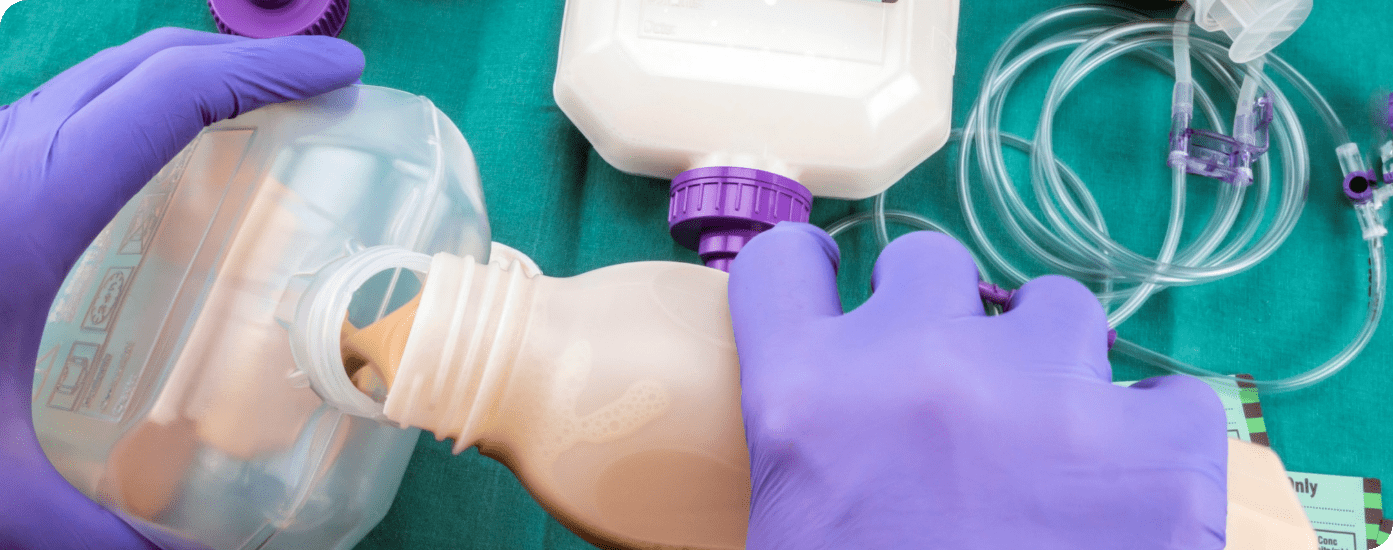Enteral Feeding and Management in Adelaide
Enteral feeding and management in Adelaide by Friendly & Graceful Care Services: Understanding the fundamental concepts in enteral feeding and management to help evaluate participants.

What is enteral feeding?
Enteral feeding is a procedure for participant to intake food through their gastrointestinal (GI) tract which comprises the mouth, oesophagus, stomach, and intestines. This method is one way for them to acquire nutrients via mouth or tube directly to the stomach or small intestine. In the medical field, enteral feeding is interchangeable with tube feeding.
The enteral feeding method provides participants with the appropriate nutrients to keep their GI tract functional since it supplies the body with the needed calorie intake and supplements. However, it is best to remember that feeding through a tube is necessary only if the participant cannot physically eat or if the required calorie intake is higher than what the participant can physically eat. Additionally, this method is conducted to avoid acquiring malnutrition and other severe health conditions.
There are two main enteral feeding tubes: prepyloric tubes and post pyloric tubes. These feeding tubes are selected depending on the enteral formula required in each participant and the anticipated duration of enteral feeding. The main difference between the two tubes is their usage. Prepyloric tube is used for participants needing intermittent feeding and gastric absorption. On the other hand, the post pyloric tube is administered continuously and used for participants who suffer from GI diseases, such as gastroparesis, acute pancreatitis, and gastric outlet stenosis.

Factors that influence the Participant’s need for enteral feeding
When participants are at risk for malnutrition, weight loss, and health issues due to the inability to eat enough, they resort to enteral feeding. Some health conditions that call for enteral feeding include stroke, cancer, critical injury, neurological or movement disorders, and dysfunction of GI, among others.
Stroke participants commonly have trouble swallowing, while cancer participants have other symptoms, such as fatigue and nausea, that cause them to have trouble eating. Low energy due to critical injuries does not allow oneself to eat appropriately, thus the need for enteral feeding. Similarly, participants with neurological disorders require large amounts of calorie intake in a day; however, they have difficulty eating, which is why they also need this feeding method.
How to conduct enteral feeding and its management
Before enteral feeding, the first thing to do is to assess the participant to prevent complications such as aspiration, tube malposition, dislodgment, and other possible concerns. The next step is to determine the appropriate tube. Feeding may already be administered once the tube is identified.
The placement of the enteral tube must also be checked so complications such as aspiration pneumonia may be prohibited. The tube’s placement should be verified through X-ray after the insertion to ensure that it is not placed into the trachea or down the bronchi. Once the placement is verified in the X-ray, the tube must be marked using adhesive tape or a permanent marker, and the mark indicates the entry point of the feeding tube. The medical staff must evaluate this mark to check any observable changes that may indicate a tube dislocation or position migration due to cough or movement of the Participant.
There is also a need to monitor the participant for any possible feeding tolerance, which is done by hearing the bowel sounds and palpating the abdomen. The participant must be assessed daily to check for any pressure damage. Moreover, the external insertion sites of tubes must be thoroughly cleaned with gauze, water, and saline because some feeding tubes may cause skin irritations.
To reduce the risk of complications from enteral feeding, the participant must be monitored and assessed from time to time for any signs of aspiration, tube clogging, tube misconnection, and intolerances and imbalances in tube feeding. Medical staff, like nurses, must perform any medical interventions to prevent such complications.

NDIS coverage and benefits
The National Disability Insurance Scheme (NDIS) funds various support services, including Enteral Feeding and Management in Adelaide. If eligible for the NDIS funds, you may enjoy the perks of receiving assistance from staff trained following the NDIS Practice Standards to ensure high-quality service in the comfort of your homes.
If you are an existing participant of the NDIS and want to know more about incorporating Enteral Feeding and Management services into your care plan, you may contact us.
What FGCS can do for you?
Here at FGCS, we can help you by having our trained professionals manage your enteral feeding in the most careful way possible. We guarantee that our team can address your care support needs and provide you with the relevant and appropriate treatment. All staff of FGCS are more than willing to guide you in every step of your recovery.
Contact us for more information on Enteral Feeding and Management in Adelaide and other services we can offer.





